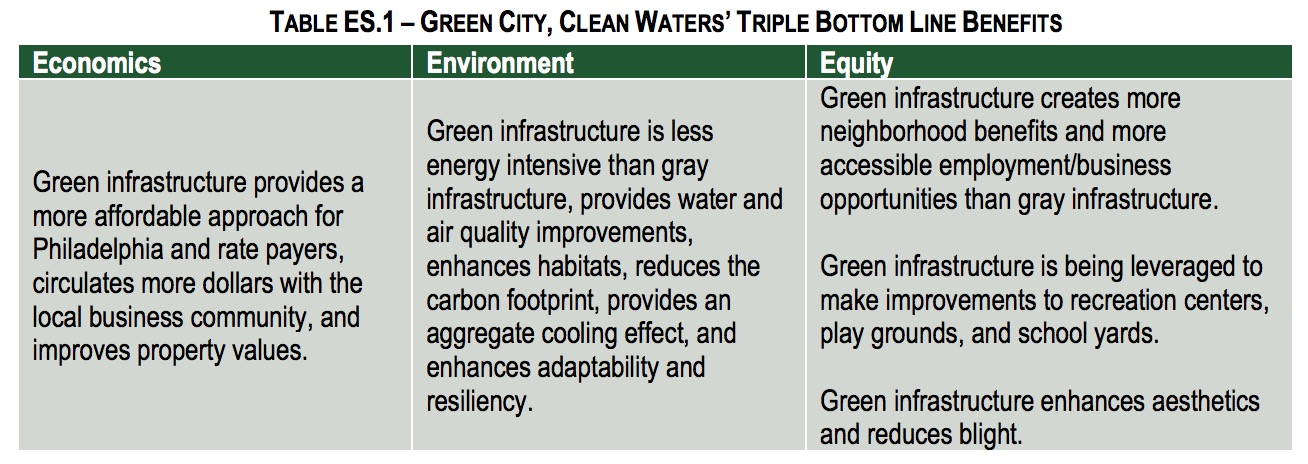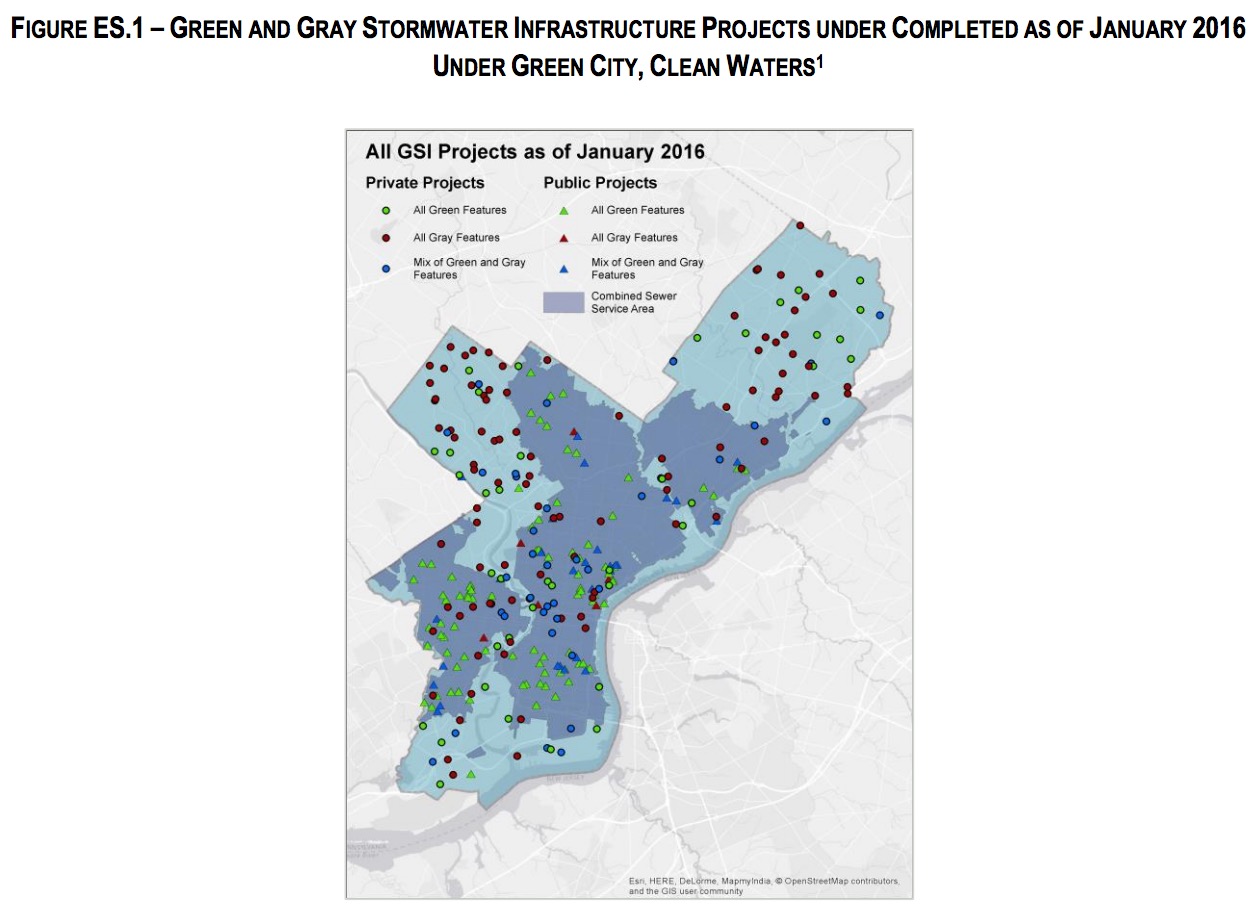SUSTAINABLE BUSINESS NETWORK
OF GREATER PHILADELPHIA
Executive Summary
The purpose of this report is to articulate the local economic impact of Green City, Clean Waters (GCCW), an ambitious initiative of the Philadelphia Water Department that seeks to invest in green stormwater infrastructure (GSI) projects throughout the City of Philadelphia. GCCW fulfills federally established water quality requirements in ways that are simultaneously environmentally sustainable, positive for the local economy, and beneficial to neighborhoods throughout the City (see Table ES.1).
GCCW is currently in Year 5 of a 25-year program, so it is useful to both account for its successes to date and point to even greater impacts upon further implementation of efforts. This report reaches the following key findings:
Stormwater Management Regulations for Development have helped catalyze a best-in-class GSI industry cluster, with meaningful consequences for the local economy. The local GSI industry is believed to be experiencing double-digit annual growth, and conservatively represents annual economic impact of almost $60 million within the city of Philadelphia, currently supporting 430 local jobs and generating nearly $1 million in local tax revenues. Innovative solutions birthed by local vendors in response to GCCW have produced export opportunities for the benefit of the local economy and have established Philadelphia’s status as a leader in stormwater management; positive media coverage, national awards, and emulation from such cities as New York City and Washington have followed.
Public investment in GSI boosts the local economy. Philadelphia Water has projected that it will invest approximately $1.2 billion in stormwater infrastructure projects over the life of GCCW, and is inducing additional private GSI projects through regulation and incentives. Conservatively, these investments will produce a $3.1 billion impact in the Philadelphia economy, supporting about 1,000 jobs per year and generating $2 million per year in local tax revenues for the entire 25-year period.
GSI projects advance social equity. GSI has proven superior to traditional gray infrastructure solutions in generating more accessible on-ramps for individuals to find employment opportunities and for businesses to find contract opportunities. Also, both GSI investments by Philadelphia Water and private GSI investments induced by regulation and incentives can be found in neighborhoods throughout Philadelphia (see Figure ES.1), and hence the benefits they confer at a very local level are enjoyed by a wide range of household income levels. Indeed, the majority of GSI projects (public and private) are located in relatively low-income neighborhoods (with very few in relatively high-income neighborhoods), with some becoming beloved amenities for communities even as they perform an important ecological function.
GSI represents a neighborhood-level amenity that provides a wide range of quality of life benefits, stabilizing home values, growing the city’s property tax base, and making possible more private investment throughout the city. GSI projects beautify areas, create active recreation opportunities in neighborhoods previously lacking such resources, reduce the negative effects of urban blight, and perform valuable ecological services, including cleaner air and less flooding. These gains are enjoyed in neighborhoods throughout Philadelphia, and have resulted in increases in property values relative to houses not near GSI projects. It is estimated that proximity to a GSI feature produces a 10+ percent increase in house value, which means that the 496 GSI projects that have been completed in the first five years have yielded an aggregate $1.3 billion increase in citywide property value, producing an annual increase of $18 million in property taxes for City government and for the School District of Philadelphia.
Five years into an ambitious, daring, and innovative 25-year plan to address federal water quality requirements, GCCW has demonstrated present results and future potential. Its premise is to deal with stormwater on site and in a distributed fashion, using green infrastructure solutions, rather than move it to centralized locations and treating it in traditional gray infrastructure ways. But its promise is grander: to simultaneously pursue economic gain, environmental sustainability, and community benefit, and to not only orient public sector action in this way but to impel private sector participation to the same end. It appears that GCCW’s greatest legacy is to encourage a triple bottom line approach to water quality requirements that saves municipal government billions of dollars and in turn invests in desirable neighborhood amenities, creates local employment and economic opportunities, positively impacts the Philadelphia economy, and generates tax revenue gains for the Philadelphia government.
Download full version (PDF): The Economic Impact of Green City, Clean Waters – The First Five Years
About the Sustainable Business Network of Greater Philadelphia
www.sbnphiladelphia.org
The mission of the Sustainable Business Network is to build a just, green, and thriving economy in the Greater Philadelphia region. We accomplish this by educating and growing a broad base of local, independent businesses and educating policymakers and the public.
Tags: GCCW, Green City Clean Waters, PA, Pennsylvania, Philadelphia, Sustainable Business Network of Greater Philadelphia








 RSS Feed
RSS Feed